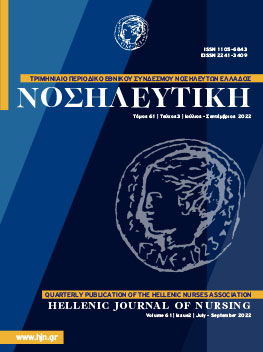Measuring Levels of Anxiety and Depression in Nursing Staff
Introduction: Stress and depression are two conditions that play a vital role, both in social and professional lives. Taking into consideration that Nursing is a high-demand job, it becomes clear that both symptoms cannot be absent from the nurse’s life.
Purpose: This clinical trial aims to measure the levels of anxiety and depression in nursing staff.
Material and Method: Beck's valid questionnaire containing 42 questions was used. The sample (n=150) consisted of nurses working in both public and private hospitals in Patras and Athens as well as in health centers in the prefecture of Achaia. Statistical package SPSS 23 was used for statistical analysis.
Results: Most par- ticipants were 31–50 years old, women (85.3%), married (65.3%), with an annual family income of 10,001-20,000 euros (48%), did not have a master's degree (85.3%), worked in a public hospital (92.7) %) and starting work be- fore 2009 (65.3%). Also, the majority of nursing staff show low levels of anxiety (70.7%) and depression (56.7%). A statistically significant correlation was found between stress levels with the working city (p<0.05) and with the work sector (p<0.05). Finally, a statistically significant correlation was found between the levels of depression and the city of work (p<0.05) and working sector (p <0.05).
Conclusion: Although the nursing staff does not appear to have high levels of anxiety and depression, they have identical symptoms that commonly appear in mental disorders. Therefore, it becomes clear that the «signs» which lead to both, anxiety and depression, should be identified and given effective treatment both in-hospital and out-of-hospital environments.
| Category: | Volume 61, Issue 2 |
| Hits: | 482 Hits |
| Created Date: | 19-10-2022 |
| Authors: | Nikolaos Bakalis , Adamantios Theodorakopoulos , Adamantia Maragou , Stamatia Siouti , Areti Tsouramani , Anastasios Tzenalis |
 English
English  Ελληνικά
Ελληνικά 

